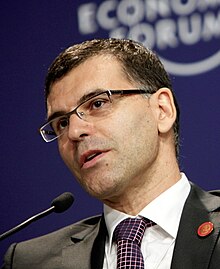This article may have been created or edited in return for undisclosed payments, a violation of Wikipedia's terms of use. It may require cleanup to comply with Wikipedia's content policies, particularly neutral point of view. (July 2023) |
Simeon Dyankov | |
|---|---|
| Симеон Дянков | |
 Dyankov at World Economic Forum, Tianjin, China, September 13, 2010 | |
| Deputy Prime Minister of Bulgaria | |
| In office July 27, 2009 – March 13, 2013 Serving with Tsvetan Tsvetanov | |
| Prime Minister | Boyko Borisov |
| Preceded by | Ivaylo Kalfin Emel Etem Toshkova |
| Succeeded by | Ekaterina Zakharieva |
| Minister of Finance | |
| In office July 27, 2009 – March 13, 2013 | |
| Prime Minister | Boyko Borisov |
| Preceded by | Plamen Oresharski |
| Succeeded by | Kalin Hristov |
| Personal details | |
| Born | July 13, 1970 Lovech, Bulgaria |
| Alma mater | University of Michigan University of National and World Economy |
Simeon Dyankov (Bulgarian: Симеон Дянков, also Djankov; born July 13, 1970) is a Bulgarian economist. From 2009 to 2013, he was the deputy prime minister and minister of finance of Bulgaria in the government of Boyko Borisov.[1][2] He has been a vocal supporter of Bulgaria's entry into the Eurozone.[3][4][5] Before his cabinet appointment, he was the chief economist of the finance and private sector vice-presidency of the World Bank.
He was an associate editor of the Journal of Comparative Economics from 2004 to 2009. Dyankov was a chairman of the board of the European Bank for Reconstruction and Development. From 2013 to 2015, he was appointed rector of the New Economic School in Moscow. Since November 2015, Dyankov has been director for policy of the Financial Markets Group at the London School of Economics.[6]
At the World Bank, Dyankov was director for development policy and senior director in the office of the chief economist.[7] He led projects on the post-communist economic transition in Georgia, Moldova and Ukraine.[8] His involvement with Ukraine has continued as participant in the Ukraine Recovery Conference since 2022.[9] Dyankov was also involved in the publication of Women Business and the Law, World Development Reports and Doing Business reports.[10] The Doing Business reports were discontinued after an audit documented that Dyankov, along with then World Bank CEO Georgieva, pressured staff to make data for China and Saudi Arabia look better.[11]
Since April 2020, Dyankov has been policy director at the Financial Markets Group at the London School of Economics. He has also been a senior fellow at the Peterson Institute for International Economics. He has written widely on the economic impact of the 2022 Russian invasion of Ukraine. This invasion has resulted in significant loss of human capital,[12] destruction of agricultural trading infrastructure,[13] huge damages to productive capacity,[14] including through the loss of electricity,[15] and a reduction in private consumption of more than a third relative to pre-war levels.[16] The all-out aggression requires an all-out response by the European Union to win the war.[17] Ukraine remains the main policy priority of the European Union in the coming decade.[18]
- ^ Simeon Djankov Heads the Finance Ministry July 27, 2009
- ^ "Bulgaria's Finance Minister Simeon Djankov: the Busiest Man on the Balkans". Novinite. August 10, 2009.
- ^ "Urgent Steps for Eurozone Entry (in Bulgarian)". bTV. April 22, 2023.
- ^ "Three Steps towards the Eurozone Entry (in Bulgarian)". Faktor. April 22, 2023.
- ^ "The Upcoming European Commission Report on Eurozone Entry Will Be Negative (in Bulgarian)". Nova TV. February 6, 2024.
- ^ "Бившият министър на финансите Симеон Дянков пред "Телеграф": Вдигането на данъци е неизбежно!". Telegraph. March 28, 2024. Retrieved March 28, 2024.
- ^ Simeon Djankov's World Bank Positions April 17, 2021
- ^ Сімеон Дянков, $4 млрд уже заподіяної шкоди, довгострокових витрат ще на $2 млрд. Яка ціна руйнування греблі Каховської ГЕС, Forbes, 15 July 2023.
- ^ Ukraine Recovery Conference in Germany: "Broad UN Commitment should sustain Ukrainian people with hope and dignity" June 11, 2024
- ^ World Development Report 2019 Team worldbank.org, accessed January 31, 2023.
- The Changing Nature of Work JStor. Retrieved January 31, 2023.
- Doing Business Founders, November 10, 2017 - ^ "Investigation of Data Irregularities in Doing Business 2018 and Doing Business 2020" (PDF).
- ^ The Loss of Human Capital in Ukraine, Noam Angrist, Simeon Djankov, Pinelopi Goldberg and Harry Patrinos, CEPR.ORG, 27 April 2022.
- ^ Oleksii Blinov and Simeon Djankov, Restarting Ukraine's Agricultural Exports, CEPR.ORG, 10 June 2022.
- ^ Oleksii Blinov and Simeon Djankov, Assessing the Damages to Productive Capacity in Ukraine, CEPR, 21 September 2022.
- ^ Oleksii Blinov and Simeon Djankov, The Economic Toll of Attacks on Ukraine's Power Grid, CEPR, 22 December 2022.
- Oleksii Blinov and Simeon Djankov, Russia's Air Attacks Cut The Ukrainian Economy by 12% in November, Forbes, 12 January 2023 (in Ukrainian). - ^ Oleksii Blinov and Simeon Djankov, Measuring Private Consumption During the War, CEPR, 24 July 2022.
- ^ Oleksii Blinov and Simeon Djankov, The all-out aggression requires an all-out response, CEPR, 18 February 2023.
- ^ Simeon Djankov, The EU prosperity is marked by the war in Ukraine, Atlantic Council, 26 February 2024.